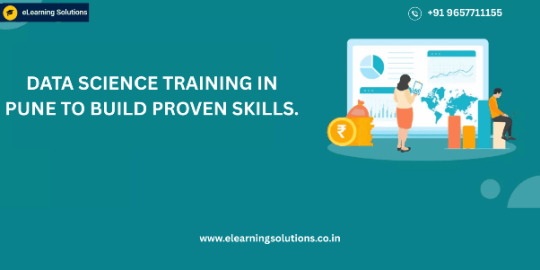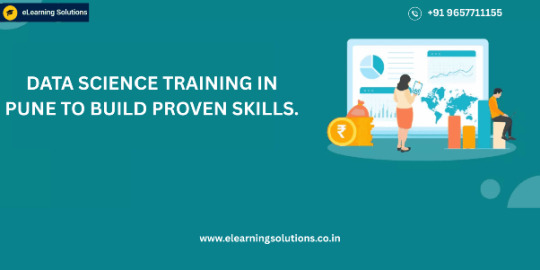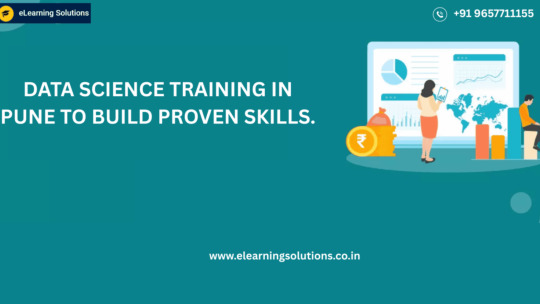#CareerInDataScience
Explore tagged Tumblr posts
Text
Data Science and Data Analytics Course - BIIT Technology
Master Data Science & Analytics with BIIT Technology! 💻 Get expert training, real-world projects, flexible batches & up to 25% OFF. Start your career in tech today!
#DataScience#Analytics#BIIT#DataAnalytics#BIITTechnology#DataScienceCourse#PythonForDataScience#MachineLearning#PowerBI#TableauTraining#BIITLaxmiNagar#CareerInDataScience#DataAnalyticsCourse#LearnDataScience
0 notes
Text
Data science training in Pune to build proven skills.

Master Data Science in Pune and transform your career with industry-ready skills! Our hands-on training covers Python, Machine Learning, AI, SQL, and real-world projects to make you job-ready. Whether you're a fresher or a working professional, build a solid foundation and become a certified Data Scientist with us.
#DataSciencePune#DataScienceTraining#LearnDataScience#PuneTechTraining#PythonForDataScience#MachineLearningPune#CareerInDataScience#DataScienceBootcamp#AITrainingPune#JobOrientedCourses#TechTrainingPune#FutureReadySkills#DataScienceWithPlacement
0 notes
Text
Data science training in Pune to build proven skills.

Master Data Science in Pune and transform your career with industry-ready skills! Our hands-on training covers Python, Machine Learning, AI, SQL, and real-world projects to make you job-ready. Whether you're a fresher or a working professional, build a solid foundation and become a certified Data Scientist with us.
#DataSciencePune#DataScienceTraining#LearnDataScience#PuneTechTraining#PythonForDataScience#MachineLearningPune#CareerInDataScience#DataScienceBootcamp#AITrainingPune#JobOrientedCourses#TechTrainingPune#FutureReadySkills#DataScienceWithPlacement
0 notes
Text
Data science training in Pune to build proven skills.

Master Data Science in Pune and transform your career with industry-ready skills! Our hands-on training covers Python, Machine Learning, AI, SQL, and real-world projects to make you job-ready. Whether you’re a fresher or a working professional, build a solid foundation and become a certified Data Scientist with us.
#DataSciencePune#DataScienceTraining#LearnDataScience#PuneTechTraining#PythonForDataScience#MachineLearningPune#CareerInDataScience#DataScienceBootcamp#AITrainingPune#JobOrientedCourses#TechTrainingPune#FutureReadySkills#DataScienceWithPlacement
0 notes
Text
Real Stories. Real Reviews. | Ashu Singh on Uncodemy's Data Science Course
👋 Meet Ashu Singh, one of the many learners actively sharing their experiences on AnalyticsJobs.in — India’s only course review platform dedicated to data science, analytics, and tech education!
Recently, Ashu dropped an insightful review of the Data Science course by Uncodemy, covering everything from: ✅ Course content ✅ Instructor quality ✅ Learning experience ✅ Real-world applicability ✅ Value for money
💬 Here's a quick glimpse from their feedback:
"The course helped me build a strong foundation in Data Science. The practical approach and case studies made a real difference!"
🎯 Thinking of enrolling in Uncodemy or just curious if it's worth it?
👉 Click here to check out Ashu’s full review and dozens more: 🔗 https://analyticsjobs.in/question/uncodemy-reviews-career-tracks-courses-learning-mode-fee-reviews-ratings-and-feedback/
📢 Already taken the course? Share your own review and help fellow learners make better decisions. Your experience could be someone’s turning point!
#DataScience #CourseReview #Uncodemy #AnalyticsJobs #EdTechIndia #CareerInDataScience #StudentVoices #RealReviewsRealResults #LearningPath #UpskillIndia #DataAnalytics #HonestReviews

#DataScience#CourseReview#Uncodemy#AnalyticsJobs#EdTechIndia#CareerInDataScience#StudentVoices#RealReviewsRealResults#LearningPath#UpskillIndia#DataAnalytics#HonestReviews
0 notes
Text
🤖 Step Into the Future with Data Science, AI & ML! 📊

Join Insys Technologies for an expert-led training in Data Science with AI & ML—designed to equip you with in-demand skills in: ✅ Data Analysis ✅ Machine Learning & Artificial Intelligence ✅ Python Programming
Build intelligent, data-driven solutions for real-world applications! 🌍 🎓 ISO 9001:2015 Certified | Industry-Oriented IT Training
📧 [email protected] 📞 +91 7045518424 | +91 7021019517 🌐 www.insystechnologies.in
#DataScience#MachineLearning#ArtificialIntelligence#PythonProgramming#AIML#TechTraining#InsysTechnologies#CareerInDataScience#FutureSkills#ITTraining#AIIndia
0 notes
Text
Discover top data science courses in Mumbai to boost your career! Explore programs with hands-on training in Python, machine learning, AI, and more. Learn from industry experts and get job-ready with practical skills and real-world projects.
#IIM#DataScience#MumbaiCourses#LearnDataScience#DataScienceMumbai#AI#MachineLearning#PythonProgramming#TechCareers#CareerInDataScience#DataAnalytics#UpskillNow#FutureOfWork#BigData#ML#AIIndia#DataScienceTraining#TechInMumbai#EduTech#OnlineLearning#STEMCareers
1 note
·
View note
Text

🚀 Unlock Your Future with Data Science! 🌟 Master the skills that top companies demand with Modulation Digital Institute’s expert-led data science course in Delhi. From Python and AI to real-world projects and 100% placement support—we’ve got you covered! 📊 Book your free demo class now and transform your career! 💼🔥
0 notes
Text
1 note
·
View note
Text
Best Data Science Institute in Laxmi Nagar

Best Data Science Institute in Laxmi Nagar
1. Introduction
Data Science has emerged as one of the most sought-after fields in today’s data-driven world. It combines statistical analysis, machine learning, and business intelligence to extract valuable insights from data. For individuals aspiring to build a career in this booming field, choosing the right institute is crucial. Modulation Digital stands out as the Best Data Science Institute in Laxmi Nagar, offering top-notch training that equips students with the skills required to excel in this domain.
At Modulation Digital, we focus on a practical and industry-oriented approach to learning. Our comprehensive curriculum, experienced trainers, and state-of-the-art facilities ensure that every student gains a deep understanding of data science concepts, making them job-ready for competitive markets. Whether you're a beginner or looking to advance your career, Modulation Digital is the perfect place to start.
2. Why Choose Laxmi Nagar for Data Science Training?
Laxmi Nagar has become a hub for educational excellence in Delhi, offering easy access to some of the best institutes for technical and professional courses. Its strategic location and vibrant student community make it an ideal place to pursue data science training. Being centrally located, it’s well-connected by public transport, making it convenient for students from across Delhi.
Opting for Modulation Digital, the Best Data Science Institute in Laxmi Nagar, gives students a distinct advantage. We provide hands-on training, mentorship, and exposure to real-world projects. Laxmi Nagar’s dynamic learning environment fosters collaboration and innovation, creating the perfect setting for aspiring data scientists to thrive.
3. About Modulation Digital
Modulation Digital is a premier institute offering world-class data science training in Laxmi Nagar. Recognized as the Best Data Science Institute in Laxmi Nagar, we are committed to delivering high-quality education that aligns with industry standards. Our programs are designed to cater to beginners as well as professionals seeking advanced knowledge in data science.
We pride ourselves on a team of experienced trainers who bring years of industry expertise to the classroom. At Modulation Digital, students learn through a mix of theoretical knowledge and practical applications, including working on real-world datasets. Our institute has successfully trained hundreds of students who are now thriving in their careers as data scientists, analysts, and machine learning engineers.
4. Key Features of Modulation Digital
As the Best Data Science Institute in Laxmi Nagar, Modulation Digital offers a wide range of features that set us apart:
Comprehensive Curriculum: Our course covers everything from Python programming and statistical analysis to machine learning and data visualization.
Experienced Trainers: Learn from industry experts who provide valuable insights and practical knowledge.
Hands-On Training: Work on live projects and real-world datasets to gain practical experience.
Modern Facilities: State-of-the-art infrastructure and resources for an optimal learning experience.
Placement Assistance: Dedicated support to help students secure rewarding job opportunities in the field of data science.
With these features, Modulation Digital ensures that every student is well-prepared to meet the demands of the data science industry.
5. Benefits of Choosing Modulation Digital
When you enroll at Modulation Digital, the Best Data Science Institute in Laxmi Nagar, you unlock numerous benefits:
Industry-Relevant Skills: Gain in-depth knowledge of data science tools and technologies like Python, R, SQL, and Tableau.
Career Growth: Equip yourself with the skills to secure high-paying jobs in the growing data science field.
Networking Opportunities: Connect with peers and industry professionals to build valuable relationships.
Flexible Learning Options: Choose from weekday or weekend batches to fit your schedule.
Lifetime Support: Access course materials and career guidance even after completing your training.
These benefits make Modulation Digital the preferred choice for data science training in Laxmi Nagar.
6. Curriculum Overview
The data science course at Modulation Digital is designed to cover all essential topics, ensuring a holistic learning experience. Key modules include:
Introduction to Data Science: Basics of data science and its applications.
Programming for Data Science: Python, R, and SQL.
Statistics and Probability: Foundation for machine learning algorithms.
Data Visualization: Tools like Tableau and Power BI.
Machine Learning: Supervised and unsupervised learning techniques.
Capstone Project: Apply your skills to solve a real-world problem.
Each module is structured to provide a blend of theoretical knowledge and hands-on experience, ensuring that students are job-ready upon course completion.
7. Success Stories from Modulation Digital
At Modulation Digital, we take pride in the success of our students. Here are a few testimonials:
“Enrolling at Modulation Digital was the best decision I made for my career. The trainers were knowledgeable, and the hands-on projects prepared me for the real world.”
“The placement assistance provided by Modulation Digital was excellent. I secured a job as a data analyst within two months of completing the course.”
These stories reflect our commitment to excellence and our role as the Best Data Science Institute in Laxmi Nagar.
8. Frequently Asked Questions (FAQ)
Why is Modulation Digital the best choice for data science training in Laxmi Nagar? We offer a comprehensive curriculum, experienced trainers, and hands-on learning opportunities, making us the preferred institute for data science.
What are the prerequisites for joining the course? No prior experience is needed. Our course is designed for beginners and professionals alike.
What career opportunities can I expect after completing the course? Graduates can pursue roles like data scientist, data analyst, machine learning engineer, and more.
9. Call to Action
If you’re ready to build a successful career in data science, enroll at Modulation Digital, the Best Data Science Institute in Laxmi Nagar. Take the first step toward your dream career today! Visit us at https://www.midmweb.com for more information and to schedule a consultation.
#DataScience#LaxmiNagar#BestInstitute#DataScienceTraining#CareerInDataScience#DataAnalytics#MachineLearning#AI#DataScienceEducation#SkillDevelopment
0 notes
Text

Are you ready to embark on a transformative journey into the world of data science? APTRON Gurgaon offers industry-leading Data Science Training in Gurgaon, designed to empower aspiring professionals with the knowledge and skills required to excel in this cutting-edge field. Whether you are a beginner or a professional looking to upskill, our comprehensive training programs are tailored to meet your unique needs.
#DataScienceTraining#APTRONGurgaon#LearnDataScience#DataScienceCourse#DataAnalytics#MachineLearningTraining#BigData#CareerInDataScience#GurgaonTrainingInstitute#SkillDevelopment
0 notes
Text
youtube
Demystifying Data Scientists | Dr. Anish Roy Chowdhury Plaksha University
By 2025, global data creation is projected to grow to more than 180 zettabytes. (Statista, 2023).
This explosion of data means that firms across industries will need skilled data scientists to make sense of it.
Dr. Anish Roy Chowdhury, Associate Director of Data Science Institute, Plaksha University in our flagship i2i webinar spoke about evolving careers in data science and how to prepare for interviews, how GPTs are transforming the tech landscape, and interdisciplinary BTech degrees in Data Science, Economics and Business and Computer Science & Artificial Intelligence.
#iotatoinfinity#i2iwebinars#plakshauniversity#faculty#reimagineteched#creatorsfirst#Anishroychowdhury#datascience#careerindatascience#btech#artificial intelligence#tech leaders fellowship program#Youtube
0 notes
Text
Top Data Science Courses in Singapore to Boost Your Career in 2024
Are you looking to thrive in the dynamic world of technology and analytics? Explore Data Science Courses in Singapore, designed to equip you with the skills to excel in the ever-evolving field of data-driven decision-making. Singapore, a global hub for innovation, offers top-notch training programs to help you gain a competitive edge.
Our comprehensive Data Science Courses in Singapore cover all the essential skills, including Python programming, machine learning, big data analytics, and data visualization. Whether you're a beginner or a professional looking to upskill, these programs are tailored to meet your career goals. Learn from experienced mentors with real-world industry expertise and gain hands-on experience through practical projects.
Singapore’s robust tech ecosystem ensures access to internships, networking opportunities, and job placements with leading companies. Many courses also provide certifications recognized by global employers, making them a gateway to exciting roles like Data Analyst, Machine Learning Engineer, or AI Specialist.
Flexible learning options—from in-person workshops to online boot camps—make upskilling at your own pace easier. With a focus on cutting-edge tools like TensorFlow, Tableau, and SQL, you’ll emerge industry-ready, capable of solving complex challenges and driving innovation.
Embark on your journey to mastering data science today. Choose a Data Science Course in Singapore and open doors to unlimited career possibilities in this high-demand field. Your future in data starts here! https://iimskills.com/data-science-courses-in-singapore/
1 note
·
View note
Text
Data science training in Pune to build proven skills.

Join our industry-oriented Data Science Training in Pune and master tools like Python, Machine Learning, Power BI, SQL, and more. Whether you're a beginner or looking to upskill, our hands-on projects and expert mentors will get you job-ready.
#DataScienceTraining#PuneTech#DataSciencePune#MachineLearning#PythonTraining#CareerInDataScience#UpSkillNow#JobReadySkills#DataAnalytics#PowerBI#SQLTraining#LearnDataScience#BigDataPune#AITrainingPune#DataScienceBootcamp
0 notes
Text
No Experience? No Problem! Build a Data Science Portfolio that Shines
Building a data science portfolio without formal job experience is achievable and can set you apart in a competitive field. Here’s a guide to crafting a portfolio that showcases your skills and passion effectively.
Start with Personal Projects on topics that genuinely interest you. Use public datasets to practice your analytical abilities, and don’t hesitate to experiment. This shows your initiative and problem-solving approach. Kaggle Competitions are also excellent for gaining experience and developing hands-on skills. Competing with other data enthusiasts, you’ll sharpen your techniques and add valuable projects to your portfolio.
Having a GitHub Repository is essential; it acts as a digital portfolio of your work, allowing potential employers to see your coding style and solutions firsthand. Complement your projects by Blogging about them. Write articles that explain your process, challenges, and insights — this is an excellent way to demonstrate your understanding and communicate complex concepts.
Collaboration is another vital aspect. Teaming up with others on data science projects or online forums allows you to learn new skills, gain insights, and create a well-rounded portfolio. Completing Online Courses and sharing their projects can also add credibility, especially when you apply concepts to real-world datasets, reinforcing your ability to analyze relevant topics.
Include Capstone Projects from bootcamps or advanced courses; these projects are structured to simulate actual industry problems and showcase your readiness for professional challenges. In your portfolio, emphasize your Problem-Solving Focus — how you approached each project analytically and your findings. And don’t forget Presentation Skills: ensure your portfolio is visually engaging, easy to navigate, and organized.
This masterclass provides guidance on each step, giving you the skills and confidence to build a portfolio that reflects your strengths and captures the attention of future employers.
#DataSciencePortfolio#AspiringDataScientist#PortfolioBuilding#DataScienceCareer#NoExperienceNeeded#DataProjects#KaggleCompetitions#GitHubProjects#LearnDataScience#PortfolioTips#StandOutToEmployers#DataScienceSkills#BeginnerDataScience#CareerInDataScience#RealWorldData
1 note
·
View note
Text
Discover the pros and cons of online vs. in-person Data Science classes. Learn which learning format suits your needs, goals, and lifestyle to succeed in the growing field of Data Science.
#DataScience#OnlineLearning#InPersonClasses#DataScienceEducation#CareerInDataScience#EdTech#LearningJourney#STEM#TechEducation#DataScienceCareer
0 notes